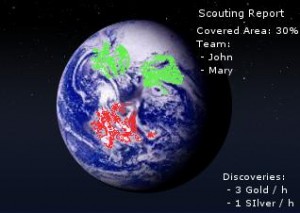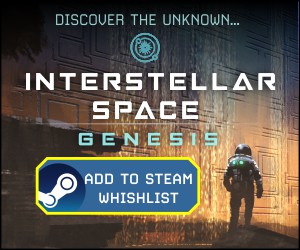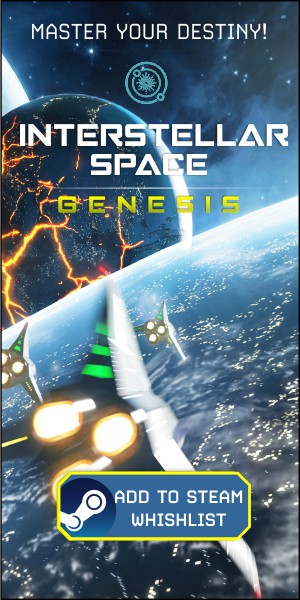In many situations I have the strange feeling that i´m doing everything too fast and I don´t have time to feel the full pleasure of playing a space strategy game. Once I build something, in a few turns it is already obsolete. A new planet is discovered, colonized and immediately I can start building structures on it. This kind of feeling, in my opinion, can be minimized. Consider planet exploration.
When reaching a planet, what its normally presented? A planet, with some characteristics presented not very well detailed. Normally colonization is made instantly and all that can be done is to start building facilities. I think more could be done to give the planets more protagonism and enhance the exploration excitement. Let us re-think the concept.
What if, when arriving a planet, we don´t know anything about it except the atmosphere characteristics and maybe some geological aspects? It would be interesting to discover the planets in the same way as we for instance discover the galaxy. The following approach could be adopted to extract the maximum experience from the planet eXploration phase.
Scout Range based planet exploration

- Scout Report
The basic idea is to established a scouting team in the planet surface before the colonization process can begin, by defining its members and equipment. They start in a specific point or points of the planet. This team should have a radius of action for each member which should increase in real time or turn based accordingly. The speed of the scout radius increases depending on the experience of the scouting team.
To help the player, a graphical status of the exploration shall be displayed also as a radius range for each explorer. It could be set a maximum of two or three scouts, to become manageable. The range shall be sensible to geographic characteristics increasing or decreasing according to the explorer characteristics. During the exploration, the current status of the resources found should be displayed to the player.
The following kinds of events would be included during the planet exploration:
- Possibility of finding some new material, technology, special artifact or knowledge
- Accidents during exploration, like injuries or deaths (in the limit the entire exploration team could be doomed during the quest).
- Encounters with other species and start diplomacy in the terrain (special species for mining, intelligent species for research or others).
- Meet other exploration species. This is where you have to show your diplomacy skills to avoid conflict.
- Spot of suitable places to start the colonization process (not all breathable planets would be suitable)
The exploration of the planet would take several turns to allow colonization and possibly continue throughout the entire game experience unlocking new places suitable for extra colonies, allow to extract more resources (due to new mining places found), etc.
I know that this may seem a little bit complex and may become a slow experience to some players that normally want more action and constant battles, but i think there are plenty of gamers who think that realism in the exploration phase by itself is already a exciting way to take pleasure when gaming.
Let me know you opinion about this.

15 Comments
Related Articles:
- Interview: Round 2 with Novacore on Legends of Pegasus
- What are 4X Games: a Definition and links to Games
- Armada 2526 – New 4x space strategy game – First Impressions
- Distant Worlds – A new Real-time, 4X Space Strategy Game
- Stellar Indie Venture: Lord of Rigel







Ugh, I liked! So clear and positively.
This sounds like an expanded version of Star Flight 2 or Star Command 2.
Hi brevatevi, can you be a little more specific? Which games are you referring to? Armada2: Star Command? Starflight 2: Trade Routes of the Cloud Nebula? …
I see two distinct kinds of games: one with a lot of planet and a simplified exploration phase and one with a more reasonable amount of colonisable/terraformable game with much more emphasis on them.
Exploration surprise can come out even years after a colony is established.
Planet can be balkanized and the different state can ally with different interstellar civilizations or multiple colony can be established.
Precursor ruins can be there in plain sight or well hidden.
Ruins sometimes can be not abandoned but just temporarily vacated… what will happen when the owner is back?
All very good points. My point behind this post was to give my 2c that space strategy games should invest more on the exploration part. Not only the star systems exploration but also the planetary exploration it self. It is as you say. Ruins could be there not immediately found or a civilization could come back. Very interesting idea by the way.
Being a big Traveller fan and collector I have to ask: why not a Scout service with related subsystem?
It could be automated but with rules to signal anything out of the ordinary for your direct micromanagement.
It will have also a First Contact Unit and programmable procedures.
It can also have capital ships who go around for five years missions in unknown space and multiracial crews.
That’s what I’m talking about :) eXploration should have more depth. A scout service with first contact units as you say, special capital ships (survey ships) that would go explore the galaxy for many years and bring valuable information.
These are all very good ideas. I think a massive game that does both star exploration and planetary exploration (with a solid research, economy, and graphics) would be a smash hit. Imaging being able to discover vastly different planets and have a party (automated) report back on scouting, new life form, new materials, all can lead to new research suggestions….WOULD BE AWESOME!!!!
Exactly! Some games already feature some exploration features but there’s little mystery, surprise or excitement about it. Some games offer ruins, derelicts, and a broad number of resources but it’s not yet enough! We need to get surprised, we need mystery. The eXploration phase of 4X games has still plenty of room for improving. This is an area new games should focus on in order to innovate the genre.
I think (most) of the 4x games games coming after MOO2 want to be MOO2. But they only became it’s somewhat distorted shadow. Planetary exploration is maybe the most superficial feature in MOO2 and so it went like that in the following 4xers.
The features you just told would be really AWESOME. A game that surprises, now that sounds really good. By the way, it’s more then 2 years since you wrote that essay. Aren’t there any news on this front ?
No much has been done in recent 4X sci-fi games regarding eXploration. I think the most recent game that does the best in this phase is Armada 2526 with the Supernova expansion pack. Sword of the Stars 2 also seems to innovate in this area with the introduction of “surveying missions” with explorer characters. But SotS2 has many problems at the moment.
Sounds like an idea worth exploring. Pun not intended. My only problem with the idea as it stands is that while the results of exploration sound compelling, the mechanic does not. I’m reminded of Mass Effect 2 and its survey system. The players all wanted to survey planets to get the best upgrades, but they did not enjoy actually surveying the planets. The developers went so far as to reduce upgrade requirements in a patch.
So what can make the process as enjoyable as the rewards? I don’t know. This is something I haven’t thought about yet. Off the top of my head maybe exploration can involve interesting choices. Suppose you encounter a biodiverse planet teeming with life, but your advisors tell you that over time it could be come an industrial powerhouse.
Do you preserve it as it is and devote resources to explore and catalog the life? If so, maybe you can discover medicines, genetic breakthroughs, biological weapons, and new sources of produce.
Do you develop it into an industrial powerhouse? Aside from the obvious benefits of production and regular nonorganic resources, maybe you can discover special resources and deep alien ruins.
Not sufficient, but maybe a step in the right direction.
Your idea reminds me of Galactic Civilizations 2. Some times when you colonize planets you are presented with a choice (normally with 2 or 3 different outcomes with impact on your reputation). I remember that you could keep a pre-existing populace and benefit from some bonuses and increased reputation, decide to move them or exterminate them completely. I liked that GalCiv2 feature a lot, and a miss it in recent 4X space games.
But in GalCiv2 that happened when you were preparing to colonize a planet. I think the best would be for that information to be acquired during survey with your exploration ships. DW does offer some of this by letting you decide if you want to investigate ruins present in planets, but that’s about it.
I like your idea. The player should be presented with choices, maybe even not all the results will be known beforehand when you’re presented with a choice, it would be “your best guess” and then see the result of your choice evolve flourishing into a super asset or a super disaster, and that’s the beauty of strategy, you never know completely what you need to do but you try to decide the best you can. After all strategy is all about choices and decisions, but not many people actually realize this I think.
I just discovered Distant Worlds last weekend, but set it aside almost immediately because I found the explore and expand aspects unbearably dull. So I’ve spent the last week thinking about this very topic. I think the first problem is that most (all?) games in this genre just consist of sci-fi veneers over traditional wargame concepts. The fact that the final X stands for exterminate pretty much says it all. I’d say the four Xs are not only listed in chronological order, but also in order of ‘increasing importance’ if you will. I think this is partly a consequence of human nature. But it’s also a consequence of the second problem: making exploration and expansion truly compelling requires _a lot_ more work (both in terms of ‘inspiration’ and ‘perspiration’) than making a similarly compelling conflict/combat dynamic. It’s hard enough in a scripted game, but in a game where the setting is randomly generated and the progression largely free-form, it really is quite daunting to even consider. What’s more, if at any point the details of exploration are likely to become ‘routine,’ I think it would do more harm than good to the gaming experience overall.
At the risk of raising an old thread, I have been feeling the same recently, as I try to discover a new, good 4X space game.
Distant Worlds is now (I bought it last week) slightly ahead of the curve compared with other titles – upon reaching the new star, the scout can determine the planets and basic characteristics, but it needs more in-depth scanning and exploration to scan each object (including large asteroids) for resources and other things.
I like that approach but think it could go further. One issue I’ve had in a lot of games is the first scout, with it’s brave crew, heads all the way out and is stranded and forgotten halfway across the galaxy when it’s fuel runs out.
I’d like to see each exploration ship ‘tag’ things that should be investigated further (habitable planets, resources, anomalies, aliens, etc) and a survey ship needing to be equipped with various survey ‘packs’ sent out to follow up and provide reports on things of real value. It would slow things down, but I think games need a little more foreplay these days, rather than cutting straight to the Big Space Battles. It makes each discovery worth more if you don’t have so many, and if you have to work for them!!!